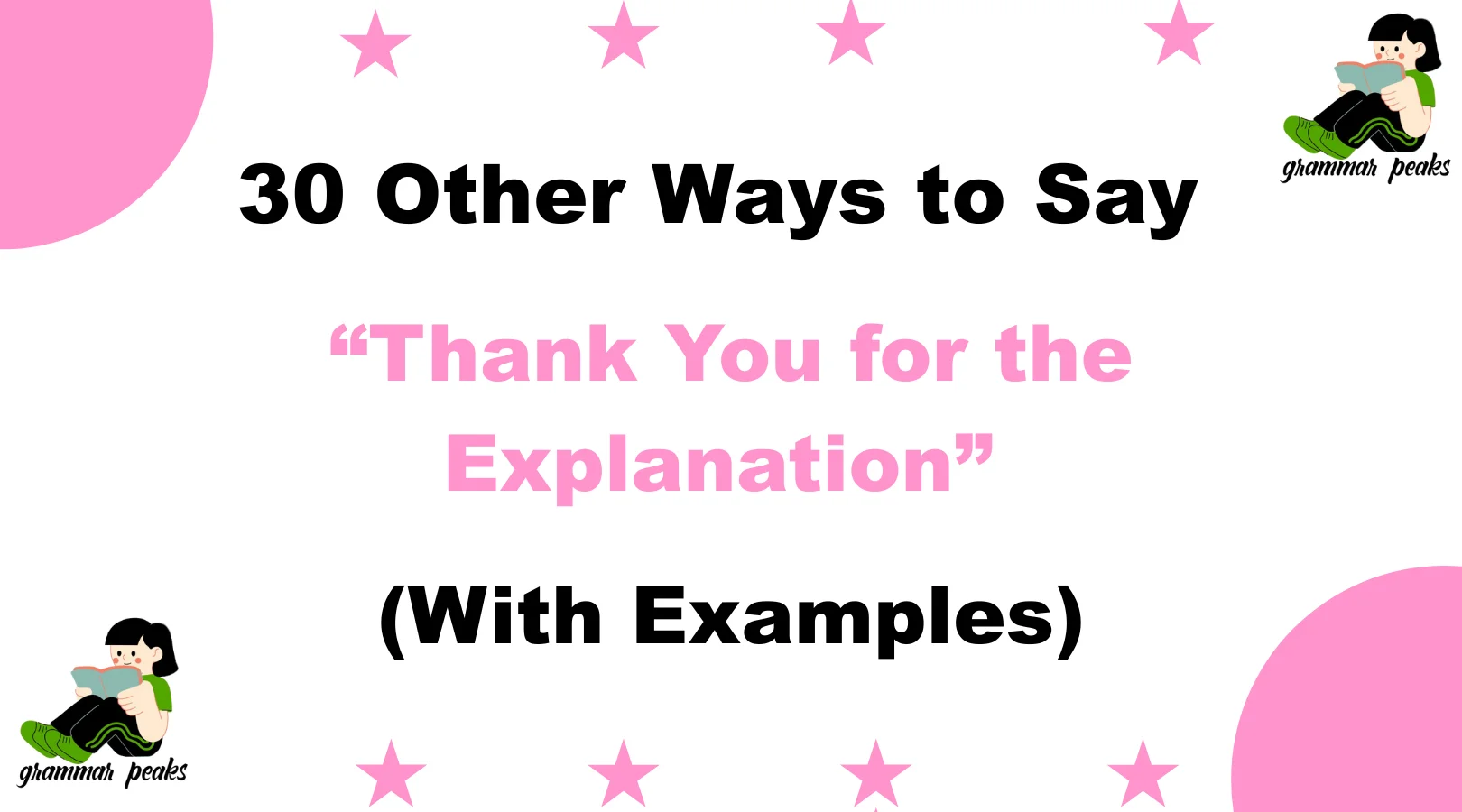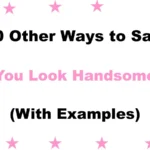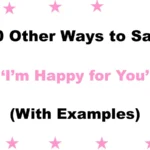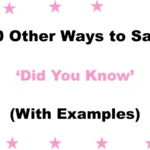Showing appreciation for someone’s clarification—especially in professional or educational settings—can go a long way. Whether you’re acknowledging a teacher, manager, colleague, or support agent, using varied phrases instead of the standard “Thank you for the explanation” can make your response more personal, respectful, and memorable. Below are 30 unique alternatives that suit different tones and contexts.
What Does “Thank You for the Explanation” Mean?
It’s a polite expression used to show appreciation when someone takes the time to clarify something that was unclear or complex. It recognizes their effort in helping you understand a concept or process better.
When to Use “Thank You for the Explanation”
Use this phrase (or an alternative) when someone helps break down an idea, offers clarification, or answers your questions thoughtfully. It’s appropriate in emails, meetings, discussions, feedback sessions, and academic or customer support settings.
Is It Professional/Polite to Say “Thank You for the Explanation”?
Yes, it is both professional and polite. However, in settings where tone matters, using alternatives can help convey more tailored emotions—such as gratitude, respect, humility, or enthusiasm—depending on the relationship and formality level.
Pros and Cons of Saying “Thank You for the Explanation”
Pros:
- Universally polite
- Clear and direct
- Suitable for most formal or casual conversations
Cons:
- Can feel repetitive or impersonal in frequent use
- May not express emotional nuance or sincerity
- Doesn’t stand out in customer feedback or professional emails
Synonyms For “Thank You for the Explanation”
- I Appreciate the Clarification
- Thanks for Breaking That Down
- That Helped Me Understand It Better
- Much Clearer Now, Thanks!
- Your Explanation Was Super Helpful
- Thanks for Walking Me Through That
- I Really Value Your Insight
- I Get It Now, Thanks to You
- That Cleared Things Up Perfectly
- Thanks for Shedding Light on That
- Thanks for Making That Clear
- That Makes a Lot More Sense Now
- Appreciate the Detailed Response
- That Was Very Informative, Thanks
- I Learned a Lot From That
- Grateful for the Insight
- You Explained That So Well
- Thanks for Taking the Time to Clarify
- Now I Understand Exactly What You Meant
- That Explanation Was Spot-On
- You Made That So Easy to Understand
- Thanks for Clearing That Up
- That Was Just What I Needed to Hear
- Appreciate the Walkthrough
- You Broke That Down Really Well
- That Was Really Clear, Thanks
- Thanks for Helping Me Understand
- That Makes Things So Much Clearer
- That Explanation Was Exactly What I Needed
- I’m Glad You Took the Time to Explain
1. I Appreciate the Clarification
Definition: A respectful acknowledgment of someone taking time to make things clearer.
Detailed Explanation: Best for professional settings where you’re showing gratitude while keeping things concise.
Scenario Example:
“Thanks, I appreciate the clarification on that policy.”
Best Use: Workplace emails, customer service replies, formal meetings
Worst Use: Very casual text conversations
Tone: Professional, appreciative
2. Thanks for Breaking That Down
Definition: A casual and friendly way to thank someone for simplifying a complex topic.
Detailed Explanation: Shows gratitude in an informal way, especially when someone makes something easier to understand.
Scenario Example:
“Thanks for breaking that down—it makes way more sense now.”
Best Use: Peer discussions, learning environments
Worst Use: High-level corporate communication
Tone: Friendly, conversational
3. That Helped Me Understand It Better
Definition: Highlights how the explanation made a positive difference in your comprehension.
Detailed Explanation: Expresses that the explanation was effective without directly using the word “thanks.”
Scenario Example:
“Your explanation really helped me understand it better.”
Best Use: Feedback to instructors, team members
Worst Use: Robotic or highly formal emails
Tone: Grateful, casual
4. Much Clearer Now, Thanks!
Definition: An upbeat way to express gratitude for improved clarity.
Detailed Explanation: Short and conversational, this phrase works well when you want to be warm but brief.
Scenario Example:
“Much clearer now, thanks! Appreciate you explaining it.”
Best Use: Slack messages, quick replies
Worst Use: Extremely formal documents
Tone: Light, casual
5. Your Explanation Was Super Helpful
Definition: A more enthusiastic and friendly way to compliment the usefulness of someone’s explanation.
Detailed Explanation: Balances friendliness with genuine appreciation.
Scenario Example:
“Your explanation was super helpful—I was totally lost before.”
Best Use: Informal conversations, feedback forms
Worst Use: Dry business emails
Tone: Appreciative, upbeat
6. Thanks for Walking Me Through That
Definition: Gratitude for a step-by-step explanation or demonstration.
Detailed Explanation: Great for tutorials, processes, or complex walkthroughs.
Scenario Example:
“Thanks for walking me through that process—it’s much clearer now.”
Best Use: Trainings, onboarding, mentoring
Worst Use: One-line answers or text-only clarifications
Tone: Respectful, warm
7. I Really Value Your Insight
Definition: A more thoughtful and professional compliment that shows you respected the explanation deeply.
Detailed Explanation: This goes beyond simple thanks—it shows esteem for the other person’s knowledge.
Scenario Example:
“I really value your insight on that topic—thank you for explaining.”
Best Use: Manager or mentor feedback
Worst Use: Casual chats
Tone: Grateful, thoughtful
8. I Get It Now, Thanks to You
Definition: A warm and personal way to say someone helped you understand.
Detailed Explanation: Feels direct and affirming, especially in spoken conversation.
Scenario Example:
“I get it now, thanks to you. That was really helpful!”
Best Use: One-on-one conversations, peer learning
Worst Use: Email subject lines or formal notes
Tone: Friendly, appreciative
9. That Cleared Things Up Perfectly
Definition: A strong statement that someone’s explanation resolved your confusion.
Detailed Explanation: Professional enough for workplace use, but still personal.
Scenario Example:
“That cleared things up perfectly—thanks for the detailed explanation.”
Best Use: Team updates, presentations
Worst Use: Text-only replies to complex issues
Tone: Respectful, clear
10. Thanks for Shedding Light on That
Definition: A slightly more poetic way to say someone helped clarify something.
Detailed Explanation: Works well when you want to keep your tone interesting and engaging.
Scenario Example:
“Thanks for shedding light on that issue—I didn’t know the background.”
Best Use: Emails, formal notes, editorials
Worst Use: Super casual responses
Tone: Thoughtful, polished
11. Thanks for Making That Clear
Definition: A straightforward thank-you that focuses on the clarity provided.
Detailed Explanation: This is ideal when someone transforms a confusing concept into something digestible.
Scenario Example:
“Thanks for making that clear—I misunderstood it before.”
Best Use: Customer support, business explanations
Worst Use: Very emotional or personal situations
Tone: Neutral, polite
12. That Makes a Lot More Sense Now
Definition: A phrase that acknowledges improved understanding without directly saying “thank you.”
Detailed Explanation: It’s useful when you want to sound conversational but still appreciative.
Scenario Example:
“That makes a lot more sense now. I appreciate the breakdown!”
Best Use: Group meetings, informal discussions
Worst Use: Legal or ultra-formal communication
Tone: Friendly, laid-back
13. Appreciate the Detailed Response
Definition: Shows recognition of the time and effort put into a thorough explanation.
Detailed Explanation: Polished and effective in email replies, especially in professional settings.
Scenario Example:
“Appreciate the detailed response—it answered all my questions.”
Best Use: Business, customer service
Worst Use: Very casual social situations
Tone: Professional, concise
14. That Was Very Informative, Thanks
Definition: A polite way to thank someone for a content-rich explanation.
Detailed Explanation: This emphasizes the educational or insightful nature of the explanation.
Scenario Example:
“That was very informative, thanks for taking the time!”
Best Use: Webinars, workshops, training sessions
Worst Use: Quick-fire chats
Tone: Polished, sincere
15. I Learned a Lot From That
Definition: A phrase that expresses gratitude by emphasizing knowledge gained.
Detailed Explanation: It’s reflective and respectful, especially when complimenting someone’s expertise.
Scenario Example:
“I really learned a lot from that overview—thank you.”
Best Use: Coaching, mentoring, presentations
Worst Use: Robotic corporate emails
Tone: Thoughtful, respectful
16. Grateful for the Insight
Definition: A slightly more formal version of saying “thanks for explaining.”
Detailed Explanation: Ideal when you want to elevate the tone without sounding overly wordy.
Scenario Example:
“Grateful for the insight on that—it helped clarify a few things.”
Best Use: Performance reviews, team reports
Worst Use: Super casual DMs or chats
Tone: Elevated, appreciative
17. You Explained That So Well
Definition: A compliment disguised as gratitude, great for one-on-one feedback.
Detailed Explanation: Encouraging and affirming, especially in learning environments.
Scenario Example:
“You explained that so well—I finally got it!”
Best Use: Education, personal conversations
Worst Use: Automated business emails
Tone: Warm, encouraging
18. Thanks for Taking the Time to Clarify
Definition: A specific acknowledgment of someone’s time and effort.
Detailed Explanation: Particularly strong in situations where the person went above and beyond to help.
Scenario Example:
“Thanks for taking the time to clarify—it means a lot.”
Best Use: Thoughtful replies, customer feedback
Worst Use: Short transactional conversations
Tone: Appreciative, respectful
19. Now I Understand Exactly What You Meant
Definition: A response that emphasizes full comprehension.
Detailed Explanation: This is a kind and clear way to validate that their explanation was effective.
Scenario Example:
“Now I understand exactly what you meant—thank you for explaining!”
Best Use: Clarifying previous confusion
Worst Use: When the explanation still left you uncertain
Tone: Confirming, thankful
20. That Explanation Was Spot-On
Definition: A modern, casual compliment for someone who nailed the explanation.
Detailed Explanation: Feels confident and sharp—ideal for peers or teammates.
Scenario Example:
“That explanation was spot-on. Appreciate it!”
Best Use: Slack chats, brainstorming sessions
Worst Use: High-formality writing
Tone: Conversational, confident
21. You Made That So Easy to Understand
Definition: A kind and affirming way to compliment the clarity of someone’s explanation.
Detailed Explanation: It works great when someone simplifies something that felt overwhelming or complex.
Scenario Example:
“You made that so easy to understand—thank you for your help!”
Best Use: Learning environments, peer discussions
Worst Use: Legal documents, formal reports
Tone: Warm, casual
22. Thanks for Clearing That Up
Definition: A casual phrase for acknowledging a helpful explanation.
Detailed Explanation: Common in spoken English and great for quick responses.
Scenario Example:
“Thanks for clearing that up—I was definitely confused at first.”
Best Use: Informal chats, email replies
Worst Use: Academic writing or corporate reports
Tone: Friendly, informal
23. That Was Just What I Needed to Hear
Definition: A grateful, personal way to express how perfectly timed or helpful the explanation was.
Detailed Explanation: Good for moments when someone’s clarification resolved a deeper doubt or question.
Scenario Example:
“That was just what I needed to hear—thank you so much.”
Best Use: Mentoring, feedback conversations
Worst Use: Formal, bureaucratic communication
Tone: Encouraging, grateful
24. Appreciate the Walkthrough
Definition: Thanks for a step-by-step explanation, often in technical or training contexts.
Detailed Explanation: A go-to for hands-on help or guidance through a process.
Scenario Example:
“Appreciate the walkthrough on that tool—it saved me a ton of time.”
Best Use: Training sessions, IT support
Worst Use: General advice or theoretical discussions
Tone: Practical, appreciative
25. You Broke That Down Really Well
Definition: A compliment that praises someone’s ability to simplify or structure information.
Detailed Explanation: Friendly and encouraging, especially in peer interactions.
Scenario Example:
“You broke that down really well—it totally clicked.”
Best Use: Learning environments, team support
Worst Use: Very formal emails
Tone: Warm, affirming
26. That Was Really Clear, Thanks
Definition: Direct and simple way of recognizing the clarity of the explanation.
Detailed Explanation: Ideal when you want to acknowledge someone without sounding overly wordy.
Scenario Example:
“That was really clear, thanks for explaining it.”
Best Use: Workplace chats, meetings
Worst Use: Deeply emotional messages
Tone: Polite, concise
27. Thanks for Helping Me Understand
Definition: A gentle and sincere phrase that credits the explainer for improving your understanding.
Detailed Explanation: Softens the message and shows humility in learning.
Scenario Example:
“Thanks for helping me understand how that works—I appreciate your patience.”
Best Use: Coaching, peer learning
Worst Use: Where a more technical or formal tone is required
Tone: Grateful, humble
28. That Makes Things So Much Clearer
Definition: Expresses relief and appreciation for the improved understanding.
Detailed Explanation: Emphasizes the positive result of their explanation.
Scenario Example:
“That makes things so much clearer—thanks again!”
Best Use: Wrap-up comments, clarifying sessions
Worst Use: Robotic or impersonal messaging
Tone: Friendly, positive
29. That Explanation Was Exactly What I Needed
Definition: Strongly validates the quality and accuracy of the explanation.
Detailed Explanation: Personal and appreciative, especially when timing or delivery was spot-on.
Scenario Example:
“That explanation was exactly what I needed to understand the process.”
Best Use: One-on-one messages, professional development
Worst Use: Extremely casual banter
Tone: Sincere, thoughtful
30. I’m Glad You Took the Time to Explain
Definition: A gratitude phrase that emphasizes appreciation for the person’s effort and time.
Detailed Explanation: Best when someone goes above and beyond in their explanation.
Scenario Example:
“I’m glad you took the time to explain everything—it really helped.”
Best Use: Thoughtful thank-you messages
Worst Use: Text shortcuts or rushed conversations
Tone: Warm, appreciative
FAQs About Saying “Thank You for the Explanation”
Q1. Is “Thank you for the explanation” formal enough for workplace use?
Yes, but using tailored alternatives like “Appreciate the clarification” or “Thanks for breaking that down” can make it feel more intentional and context-specific.
Q2. How do I sound more appreciative and less robotic in emails?
Choose more personal alternatives such as:
- “That was super helpful.”
- “Thanks for walking me through that.”
These sound more human and heartfelt.
Q3. Can I use these alternatives in customer service or support emails?
Absolutely. Phrases like:
- “Thanks for making that clear”
- “That explanation was spot-on”
…make your feedback more authentic and engaging.
Q4. Which alternatives are most appropriate for formal reports?
Stick to:
- “Appreciate the detailed response”
- “Grateful for the insight”
These convey respect and clarity without being overly casual.
Conclusion
Gratitude can be expressed in many ways—and the phrase “Thank you for the explanation” doesn’t have to be your only option. With the right alternative, you can match the tone, formality, and sincerity required for any situation—whether it’s a professional setting, educational exchange, or personal conversation.
These 30 phrases offer you a toolkit of better, clearer, and more engaging ways to show appreciation, making every interaction more meaningful and respectful.






